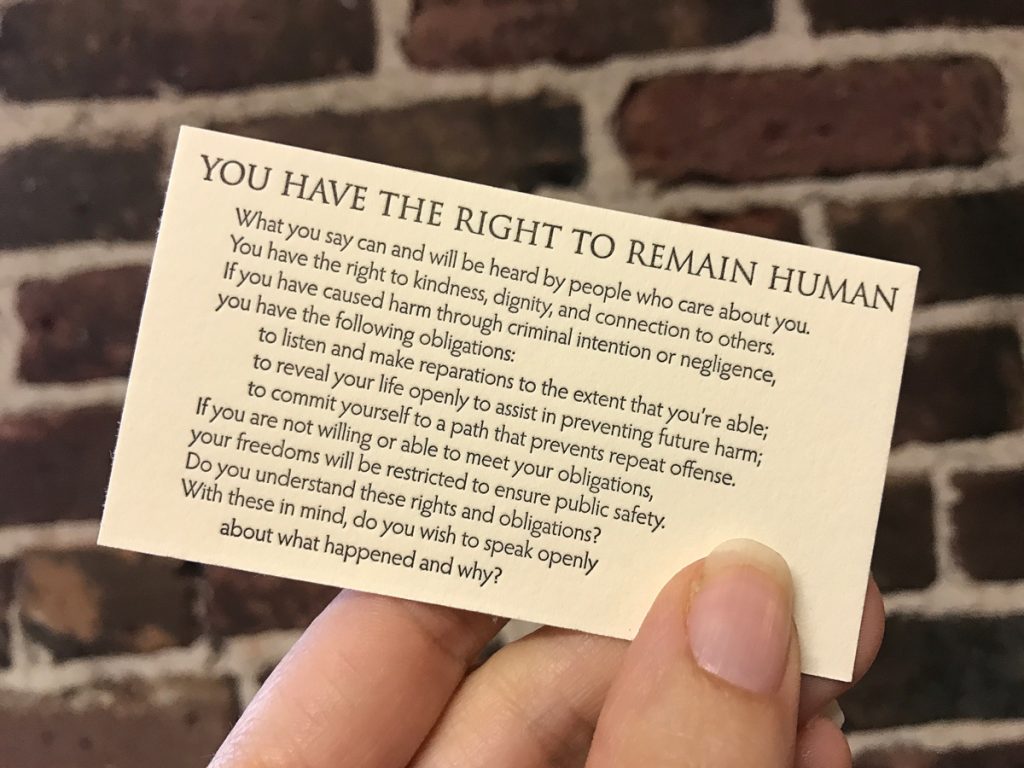
contributed by Kim Vanderheiden
You have the right to remain silent.
Anything you say can and will be used against you in a court of law.
You have the right to an attorney.
If you cannot afford an attorney,
one will be provided for you.
Do you understand the rights I have
just read to you?
With these rights in mind,
do you wish to speak to me?
In 1966, the U.S. Supreme Court gave its decision in Miranda v. Arizona, requiring that suspects in police custody be alerted to their 5th Amendment rights before interrogation. The court did not rule in what manner or with what language suspects were to be informed.
Subsequently, then Deputy Attorney General Doris Maier, along with Nevada County District Attorney and internationally renown letterpress printer Harold Berliner, were called upon to write concise language that officers in the state of California should use to comply with the Court’s decision. The result is the now famous Miranda Warning text. Berliner printed many thousands of copies of this text on wallet-sized cards and sold them to police precincts across the country. Television crime dramas began using the same text in their scripts, and today, most Americans are familiar with these words.
I am also a letterpress printer. In 2014, I began a body of work in which I was looking at the evolution of law since the time of the Magna Carta, and considering developments happening in our time. I was moved by the concept that only law through love could bring about actual justice, and began discovering the many people who have poured their careers and lives into restorative justice and other practices focusing on relationship, connection, and healing.
In this light, I considered the protective silence that we are counseled to maintain around ourselves in legal matters. The silence impedes relationship and connection, obfuscates understanding, and prevents healing and restoration. The words of the Miranda Warning are emblematic of this culture of silence.
Soon after I began exploring the harm perpetuated by silence in legal matters, I was speaking with an attorney from Dept. of Justice, who stressed, “The Miranda Warning is there to protect people! You don’t want to see what happens in countries where people don’t have this!”
Her point is important. Where someone does not have the right to be silent, ‘confessions,’ be they true or false, are obtained through torture, deceit, manipulation, and extortion. Although even with Fifth Amendment rights, these things can still happen.
Reflecting further on the protection of silence vs. the benefits of speaking, I ask, “Must we have a system that is so crushing, damaging, and frightening, that we must protect people from it, regardless of what they may have done and regardless of who may be further victims? Is such an institution actually a justice system?”
What if our system did actually focus on restoring relationship and connection, understanding causes and effects, and healing? Would we then have a system from which we don’t use every resource in our possession to protect our loved ones, – an unintended consequence in which the wealthy more frequently escape the system and the poor to more frequently pay with their lives? What if we had a process where, regardless of our personal resources, we could allow loved ones to go through it because it would be likely to help them and us?
With such a system in place, what would we say to people instead of the familiar Miranda Warning? In 2017, I made an attempt at writing new language and letterpress printed it onto wallet-sized cards:
You have the right to remain human.
What you say can and will be heard by people who care about you. You have the right to kindness, dignity, and connection to others. If you have caused harm through criminal intention or negligence, you have the following obligations:
to listen and make reparations to the extent that you’re able;
to reveal your life openly to assist in preventing future harm;
to commit yourself to a path that prevents repeat offense.
If you are not willing or able to meet your obligations, your freedoms will be restricted to ensure public safety. Do you understand these rights and obligations? With these in mind, do you wish to speak openly about what happened and why?
These cards are available, and by sharing them, you can participate in this change-making art project by helping them to be widely distributed as the original Miranda Warning cards were. Please write through Justice Conversation and let us know how many you would like, and where they should be sent. The cards are free of charge, but if you like, you can make a donation to support our work.